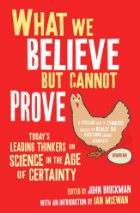ChatGPT (or any Artificial Intelligence) lacks consciousness of what it is doing and hence cannot be said to have the “free will” or “subjective impulses” to determine what direction its “thoughts” will take. (See critical comments on an earlier ChatGPT post).
A nagging question persists in the back of my mind, however. Do even humans have “free will” to guide the directions of their thoughts and conclusions? Every time I read a relatively recent work on human consciousness (e.g. Greenfield, Churchland) I am left with the disturbing notion that there may be a possibility that our consciousness of ourselves and what we are doing is an illusion. Although my inner gut resists that idea I do know that my inner gut does not have an infallible record of guiding me in the way of Truth. Ditto for my notion of “common sense”.
So it was with much appreciation and interest that I read posts on a new blog, Black Box Site, especially the second item, The Color of Your Consciousness or, Getting in Front of a Mob and Calling it a Parade. The author, Blackmun, has been keeping abreast of many more publications on consciousness than I have so it was an immense pleasure to read his survey of some research findings. His overview draws upon…
- Aitchison, Laurence, and Máté Lengyel. “With or without You: Predictive Coding and Bayesian Inference in the Brain.” Current Opinion in Neurobiology 46 (October 2017): 219–27. https://doi.org/10.1016/j.conb.2017.08.010.
- Dehaene, Stanislas. Consciousness and the Brain: Deciphering How the Brain Codes Our Thoughts. 2014.
- Nørretranders, Tor. The User Illusion: Cutting Consciousness Down to Size. 1998.
- Sacks, Oliver. An Anthropologist on Mars: Seven Paradoxical Tales. 1995.
- ———. Awakenings. 1987.
- ———. The Man Who Mistook His Wife for a Hat: And Other Clinical Tales. 1985.
- Schurger, Aaron, Jacobo Sitt, and Stanislas Dehaene. “An Accumulator Model for Spontaneous Neural Activity Prior to Self-Initiated Movement.” Proceedings of the National Academy of Sciences of the United States of America 109 (August 6, 2012): E2904-13. https://doi.org/10.1073/pnas.1210467109.
- Wegner, Daniel M. The Illusion of Conscious Will. 2018, 2002
- Wilson, Timothy D. Strangers to Ourselves. 2004.
Some concluding gems:
CARTESIAN, adj. Relating to Descartes, a famous philosopher, author of the celebrated dictum, Cogito ergo sum – whereby he was pleased to suppose he demonstrated the reality of human existence. The dictum might be improved, however, thus: Cogito cogito ergo cogito sum – “I think that I think, therefore I think that I am;” as close an approach to certainty as any philosopher has yet made. (The Devil’s Dictionary of Ambrose Bierce)
. . . .
And as Isaac Bashevis Singer liked to quip: “We must believe in free will. We have no choice.”
. . . .
. . . exactly what am I?
A rational maximizer? A child of God? A lizard that thinks it knows what it’s doing?
Does the main difference between our thinking and that of AI come down to AI having fewer hidden biases and parameters than the human brain?
It’s a fearful notion. That lizard would have no option but to resist it.

